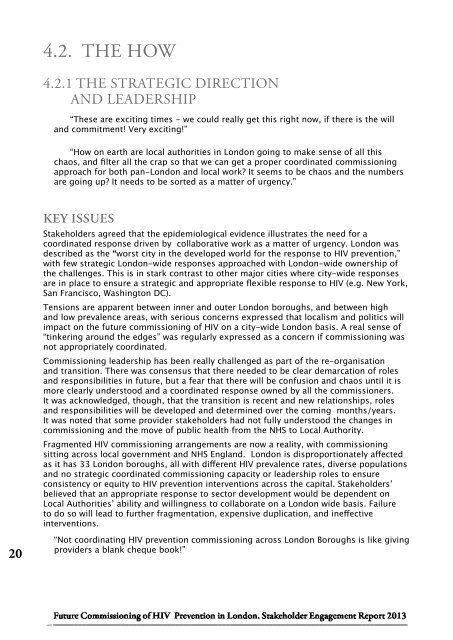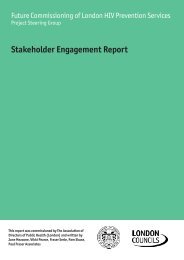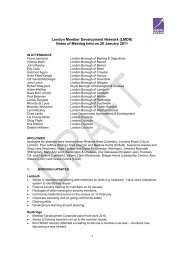Stakeholder Engagement Report - London Councils
Stakeholder Engagement Report - London Councils
Stakeholder Engagement Report - London Councils
Create successful ePaper yourself
Turn your PDF publications into a flip-book with our unique Google optimized e-Paper software.
4.2. The how<br />
4.2.1 the strategic direction<br />
and leadership<br />
“These are exciting times - we could really get this right now, if there is the will<br />
and commitment! Very exciting!”<br />
“How on earth are local authorities in <strong>London</strong> going to make sense of all this<br />
chaos, and filter all the crap so that we can get a proper coordinated commissioning<br />
approach for both pan-<strong>London</strong> and local work? It seems to be chaos and the numbers<br />
are going up? It needs to be sorted as a matter of urgency.”<br />
Key issues<br />
<strong>Stakeholder</strong>s agreed that the epidemiological evidence illustrates the need for a<br />
coordinated response driven by collaborative work as a matter of urgency. <strong>London</strong> was<br />
described as the “worst city in the developed world for the response to HIV prevention,”<br />
with few strategic <strong>London</strong>-wide responses approached with <strong>London</strong>-wide ownership of<br />
the challenges. This is in stark contrast to other major cities where city-wide responses<br />
are in place to ensure a strategic and appropriate flexible response to HIV (e.g. New York,<br />
San Francisco, Washington DC).<br />
Tensions are apparent between inner and outer <strong>London</strong> boroughs, and between high<br />
and low prevalence areas, with serious concerns expressed that localism and politics will<br />
impact on the future commissioning of HIV on a city-wide <strong>London</strong> basis. A real sense of<br />
“tinkering around the edges” was regularly expressed as a concern if commissioning was<br />
not appropriately coordinated.<br />
Commissioning leadership has been really challenged as part of the re-organisation<br />
and transition. There was consensus that there needed to be clear demarcation of roles<br />
and responsibilities in future, but a fear that there will be confusion and chaos until it is<br />
more clearly understood and a coordinated response owned by all the commissioners.<br />
It was acknowledged, though, that the transition is recent and new relationships, roles<br />
and responsibilities will be developed and determined over the coming months/years.<br />
It was noted that some provider stakeholders had not fully understood the changes in<br />
commissioning and the move of public health from the NHS to Local Authority.<br />
Fragmented HIV commissioning arrangements are now a reality, with commissioning<br />
sitting across local government and NHS England. <strong>London</strong> is disproportionately affected<br />
as it has 33 <strong>London</strong> boroughs, all with different HIV prevalence rates, diverse populations<br />
and no strategic coordinated commissioning capacity or leadership roles to ensure<br />
consistency or equity to HIV prevention interventions across the capital. <strong>Stakeholder</strong>s’<br />
believed that an appropriate response to sector development would be dependent on<br />
Local Authorities’ ability and willingness to collaborate on a <strong>London</strong> wide basis. Failure<br />
to do so will lead to further fragmentation, expensive duplication, and ineffective<br />
interventions.<br />
20<br />
“Not coordinating HIV prevention commissioning across <strong>London</strong> Boroughs is like giving<br />
providers a blank cheque book!”




